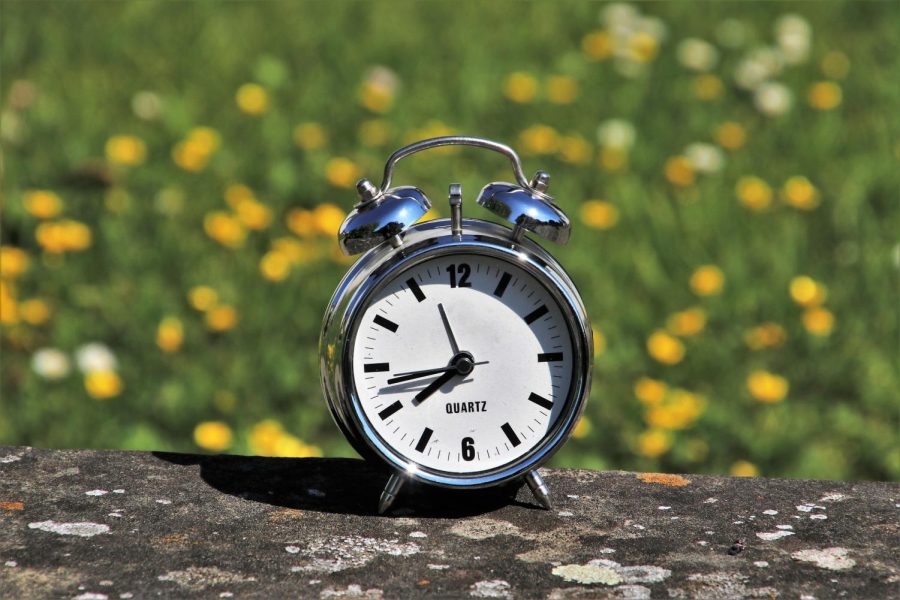Sleep and daylight saving time – a hotly contested debate
March 28, 2023
On March 12, our clocks jumped forward by an hour, much to the chagrin of those needing that precious extra hour of sleep. The concept of seasonal daylight saving time is hotly contested, with many supporting a standardized time year-round.
For students, sleep is always a recurring concern. The amount of quality sleep one gets nightly can be heavily correlated to mood, academic performance and overall performance in many aspects of life.
“Healthy sleep is incredibly important for our wellbeing,” said UNC Asheville Health and Wellness professor Jason Wingert. “Sleep supports both health and learning, and should therefore be prioritized. The past couple of decades have seen an explosion of scientific evidence on the importance of around 7-9 hours of sleep per night to support nearly every aspect of physical and mental health.”
Students can face many challenges that can complicate healthy sleep. Oftentimes, getting 7-9 hours of sleep nightly can feel impossible.
“I’d say some of the biggest challenges to healthy sleep for college students include workload, the addictive nature of social media and stress,” said UNC Asheville Health and Wellness chair and associate professor Aubri Rote.
Rote said she feels certain societal changes and regulations could help students get more and healthier sleep, but admits some of them may be challenging to implement.
“Ideally, there would be regulations on the workload we impose on students to protect their health. This would be hugely challenging to implement given the variations in student situations, backgrounds, preparation as well as differences in perspectives on what is an OK workload to assign among professors and employers. That said, nothing is impossible and it wouldn’t hurt to advocate for change. Changes are already happening in the workforce with some companies switching to a 4-day workweek or a 6-hour workday and finding great success,” Rote said.
Additionally, Rote echoes the sentiment of many students saying social media and phone usage before bed is one of the most prominent inhibitors to good sleep.
“Social media needs to change its insidious practices in getting young adults addicted to their platforms,” said Rote. “This may need to come in the form of government regulations if these companies are unwilling to do the right thing.”
UNCA sophomore Atticus Head can attest particularly to the stress aspect of getting sleep.
“Sometimes I feel stressed because it feels like I haven’t done enough work. It can really inhibit my ability to initially fall asleep,” said Head.
With the nationwide “spring forward” in the early morning hours of March 12, calls to standardize our yearly time seem to have become more prevalent than ever.
“I feel strongly that we should do away with DST,” said Rote. “It is highly disruptive to our sleep patterns.”
In March 2022, the US Senate passed legislation that would make daylight saving time permanent. The bill passed with unanimous consent, though House lawmakers failed to vote on the bill in 2022. On March 2, the bill was reintroduced by a bipartisan group of senators.
“Daylight is a very strong external cue for establishing our circadian rhythms. It may not seem like shifting our schedules by one hour should be a big deal, but this causes a sudden discrepancy between our body clock, which is set by the sun, and our social clock, which is set by humans,” said Wingert.
On top of the time changes being jarring to many people, there are some real world hazards associated with the switches.
“The sudden discrepancy between our body and social clocks with daylight saving time has been associated with several health-related problems, both acute and chronic,” said Wingert. “For example, in the days after the switch to daylight saving time in spring, we see evidence of higher rates of heart attacks and other acute cardiovascular problems. There is also evidence for increased tiredness, impaired decision making, increased car accidents and significant appetite changes following the change to daylight savings time compared with other weeks of the year.”
While daylight saving time was originally implemented to make more use of daylight, many argue that the detriments of this system outweigh the benefits.
“From a physiological perspective, I think the healthiest decision would be to move to permanent Standard Time, which would best align the sun clock with our social clocks. But, the physical and mental effects should be carefully considered against the potential benefits,” Wingert said.
No matter what, it appears that sentiment is increasingly moving towards a standard time. Soon, we may not enjoy gaining an extra hour or dread losing one.


















